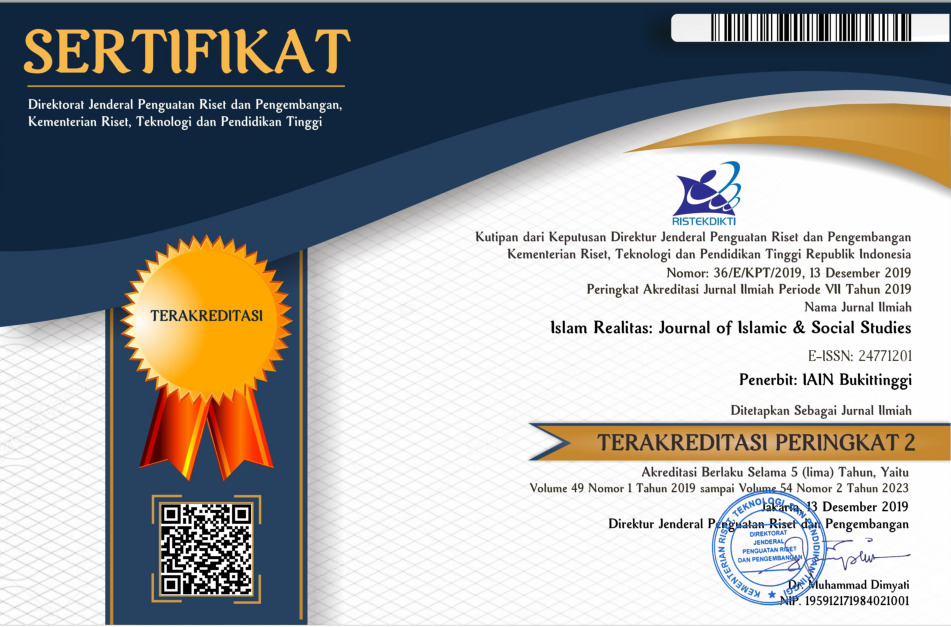FATHERING STYLES OF MUSLIM FAMILIES PERCEIVED FROM PERSONALITY TYPES IN NORTH SUMATERA
Downloads
Additional Files
Fathering styles are highly influenced by the cultural background from which the father are raised. These styles will be observed by children and eventually become an imitated model for children in shaping their attitude and behaviour as well as their ethnic identity representing their cultural values. The objectives of this research are to know the difference of fathering styles between fathers in Minangkabau families and Batak families perceived from their personality types. The subjects of this research were 90 fathers in Medan, North Sumatera which consist of 45 fathers of Minangkabau ethnicity and 45 fathers of Batak ethnicity. The data of the study were collected by using two scales, which are personality types scale and fathering style scale. Analysis of Variance (ANOVA) was applied to analyze the data. The result of the analysis shows that personality types and ethnicity interact each other in affecting fathering styles (F: 5.872; p = 0.004 < 0.05), so there is a difference of fathering styles between Minangkabau fathers and Batak fathers perceived from introvert and extrovert personality types. A final contribution of this study is the effort to save young generation who live fatherless and support well function families through fathers’ role in transmitting good cultural values of fathers’ ethnicity, so it is suggested that fathers’ involvement should be existed in raising children’s development any condition even divorce can not be avoided. The paternal figure should always be present in children’s lives both my father’s direct involvement and by the involvement of other paternal figures. The good paternal figure will help children to avoid the social problems they face in life
Â
Pola pengasuhan ayah tidak terlepas dari latar belakang budaya yang mempengaruhi kepribadian ayah sejak kecil. Pola pengasuhan ayah akan diamati oleh anak dan menjadi model figur yang ditiru anak dalam berperilaku dan menjadi ciri identitas etnik yang mewakili kepribadian sukunya. Penelitian bertujuan untuk mengetahui dan memahami perbedaan pola pengasuhan ayah ditinjau dari tipe kepribadian pada keluarga Batak Muslim dan keluarga Minang. Subjek penelitian adalah 90 orang ayah di Kota Medan, Sumatera Utara yang terdiri 45 orang ayah suku Minang dan 45 orang ayah suku Batak. Pengambilan data menggunakan dua skala, yaitu skala tipe kepribadian dan skala pola asuh ayah. Analisis Varians dua arah (Two Ways ANOVA) digunakan sebagai metode untuk mengalisis data. Hasil analisis data menunjukkan bahwa tipe kepribadian dengan suku saling berinteraksi dalam mempengaruhi pola pengasuhan ayah. Kontribusi penelitian ini adalah untuk menyelamatkan generasi muda yang hidup tanpa ayah dan mendukung keutuhan fungsi keluarga melalui peran ayah dalam mentransmisi nilai budaya yang baik dari sukunya, maka disarankan agar keterlibatan ayah hendaknya diupayakan dalam kondisi apapunBerdasarkan hasil penelitian di atas, disarankan agar keterlibatan ayah dalam pengasuhan anak harus ada dalam kondisi apapun, bahkan saat perceraian tak dapat dihindarkan. Figur ayah tidak boleh hilang dalam kehidupan anak baik itu dengan menghadirkan keterlibatan ayah secara langsung maupun dengan menghadirkan figur lain yang dapat melakukan peran ayah. Figur ayah yang baik akan membantu anak terhindar dari masalah-masalah sosial yang dihadapi dalam kehidupannya
Books
Al-Mehri, The Quran Saheeh International Translation (Birmingham: Islamic Publisher, 2010)
Andayani, Budi Koentjoro, Psikologi Keluarga Peran Ayah Menuju Coparenting, CV Mitra Media (Surabaya, 2004).
Anderson, Stephen A., Family Interaction: A Multigenerational Developmental Perspective (Boston: Allyn and Bacon, 2003)
Baharits, Adnan Hasan Shalih, Tanggung Jawab Ayah terhadap Anak Laki-laki (Jakarta: Gema Insani, 1996)
Dagun, Save M., Psikologi Keluarga (Jakarta: Rineka Cipta, 2013)
Istadi, Irawati, Melipatgandakan Kecerdasan Emosi Anak (Bekasi: Pustaka Inti, 2006)
Pauline, G. Boss (ed.al), Source of Family Theories and Methods : a Contextual Aapproach (New York: Plenum Press, 1993)
Pipes, Harriette and Mc Adoo, Family Ethnicity: Streght in Diversity, 2nd edition (California: Sage Publication, Inc., 2015)
Poerwanti, Endang, Pemahaman Psikologi Masyarakat Indonesia Sebagai Upaya Menjembatani Permasalahan Silang Budaya (Malang: Lembaga Kebudayaan-Universitas Muhammadiyah Malang, 2006)
Purnomo, Faisal Aji, Transcultural Pola Asuh di Suku Minangkabau (Semarang: Politeknik Kesehatan Kementrian Kesehatan Semarang Press, 2015)
Sears, David C., Jonathan L. Freedman, Psikologi Sosial (Jakarta: Erlangga, 2001)
Selin, Helaine (ed.al), Parenting Across Cultures_ Childrearing, Motherhood and Fatherhood in Non-Western Cultures, Science Across Cultures: The History of Non-Western Science (UK: Spingers, 2014), p. 231. <https://doi.org/10.1007/978-94-007-7503-9>.
Journals
Alghafli, Zahra, Trevan Hatch, and Loren Marks, ‘Religion and Relationships in Muslim Families: A Qualitative Examination of Devout Married Muslim Couples’, Religions, 5 (2014), 814–33 <https://doi.org/10.3390/rel5030814>
Archer, John, ‘Sex Differences in Social Behavior: Are the Social Role and Evolutionary Explanations Compatible?’, American Psychologist, 51 (1996), 909–17 <https://doi.org/10.1037/0003-066X.51.9.909>
Bornstein, Marc H., ‘Parenting and Child Mental Health: A Cross-Cultural Perspective’, World Psychiatry, 2013 <https://doi.org/10.1002/wps.20071>
Dufur, Mikaela J., Nyssa C. Howell, Douglas B. Downey, James W. Ainsworth, and Alice J. Lapray, ‘Sex Differences in Parenting Behaviors in Single-Mother and Single-Father Households’, Journal of Marriage and Family, 72 (2010), 1092–1106 <https://doi.org/10.1111/j.1741-3737.2010.00752.x>
Kerr, David C.R., Nestor L. Lopez, Sheryl L. Olson, and Arnold J. Sameroff, ‘Parental Discipline and Externalizing Behavior Problems in Early Childhood: The Roles of Moral Regulation and Child Gender’, Journal of Abnormal Child Psychology, 32 (2004), 369–83 <https://doi.org/10.1023/B:JACP.0000030291.72775.96>
Kwon, Jae Yung, John L. Oliffe, Joan L. Bottorff, and Mary T. Kelly, ‘Heterosexual Gender Relations and Masculinity in Fathers Who Smoke’, Research in Nursing and Health, 37 (2014), 391–98 <https://doi.org/10.1002/nur.21614>
Di Maggio, Rosanna, and Carla Zappulla, ‘Mothering, Fathering, and Italian Adolescents’ Problem Behaviors and Life Satisfaction: Dimensional and Typological Approach’, Journal of Child and Family Studies, 23 (2014), 567–80 <https://doi.org/10.1007/s10826-013-9721-6>
Noviati, ‘Strategi Pengasuhan Anak oleh Ibu Tunggal dan Bapak Tunggal Mengembangkan Perilaku Etis Pergaulan’, Jurnal Kajian Moral Dan Kewarganegaraan, 2 (2015), 1–15
Rahman, Istianah A, ‘Hubungan antara Persepsi terhadap Pola Asuh Demokratis Ayah dan Ibu dengan Perilaku Disiplin Remaja’, Lentera Pendidikan : Jurnal Ilmu Tarbiyah dan Keguruan, 11 (2008), 69–82 <https://doi.org/10.24252/lp.2008v11n1a6>
Rahman, Putri, and Elvi Yusuf, ‘Gambaran Pola Asuh Orangtua pada Masyarakat Pesisir Pantai’, Predicara, 1 (2012)
Selin, Helaine, and Helaine Selin, Parenting Across Cultures_ Childrearing, Motherhood and Fatherhood in Non-Western Cultures, Science Across Cultures: The History of Non-Western Science, 2014 <https://doi.org/10.1007/978-94-007-7503-9>
Suciati, Rina, and Ivan Muhammad Agung, ‘Perbedaan Ekspresi Emosi pada Orang Batak, Jawa, Melayu dan Minangkabau’, Jurnal Psikologi, 2017 <https://doi.org/10.24014/jp.v12i2.3236>
Sukaidawati, Lisnani, D.K. Pranaji, and Ratna Megawangi, ‘Konsep Diri Ibu dan Remaja pada Keluarga Cerai dan Utuh’, Jurnal Ilmu Keluarga dan Konsumen, 2016 <https://doi.org/10.24156/jikk.2016.9.1.11>
Wolfe, Anne, Women and Crime, Science News (Macmillan International Higher Education, 1975), CVIII <https://doi.org/10.2307/3960173>
Other references
Depaiva, Ruth, ‘Quality of Fathering and Its Relationship with Family Background, Demographics, and Characteristics of Present Family: A Study of Seventh-Day Adventist Fathers and Fathers From a National Sample’ {unpublished doctoral thesis, Andrews University School of Education, New York, 1998)
Koffi, Lacei R., ‘Adolescents' Perceptions of Fathering Factors that Influence Identity Development’ {unpublished doctoral thesis, Texas Woman's University, Denton & Texas, 2011)
Kuntadi, Heru, ‘Gaya Pengambilan Keputusan Ditinjau Dari Tipe Kepribadian’ {unpublished magister thesis, Fakultas Psikologi Universitas Gajah Mada, Yogyakarta, 2004
Littunen, Satu Perälä, ‘Cultural Images of a Good Mother and a Good Father in Three Generations’ {unpublished doctoral thesis, Faculty of Education of the University, Jypaskyla, 2004}
Sipahutar, Rintar, ‘Hubungan yang Kaku antara Ayah dan Anak Laki-Lakinya dalam Suku Batak, Kompasiana < https://www.kompasiana.com/rintar_sipahutar/5a73d31ddcad5b632e5a63b2/hubungan-yang-kaku-antara-ayah-dan-anak-laki-lakinya-dalam-suku-batak?page=all> {accessed 10 March 2018}
Widyorini, Endang, ‘Perempuan Berbakat dalam Budaya Jawa’ {unpublished magister thesis, Universitas Gadjah Mada, Yogyakarta, 2004}
Authors who publish with this journal agree to the following terms:
- Authors retain copyright and grant the journal right of first publication with the work simultaneously licensed under a Creative Commons Attribution License that allows others to share the work with an acknowledgment of the work's authorship and initial publication in this journal.
- Authors are able to enter into separate, additional contractual arrangements for the non-exclusive distribution of the journal's published version of the work (e.g., post it to an institutional repository or publish it in a book), with an acknowledgment of its initial publication in this journal.
- Authors are permitted and encouraged to post their work online (e.g., in institutional repositories or on their website) prior to and during the submission process, as it can lead to productive exchanges, as well as earlier and greater citation of published work (See The Effect of Open Access).









